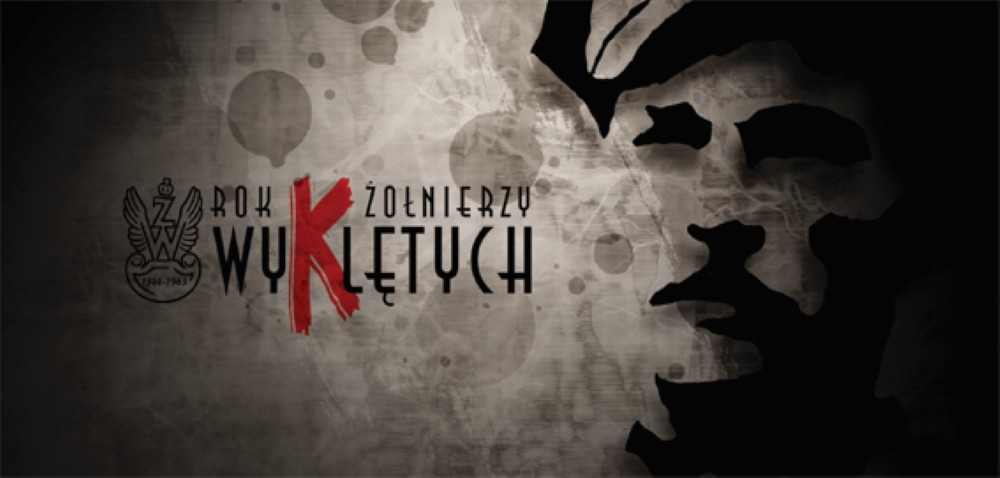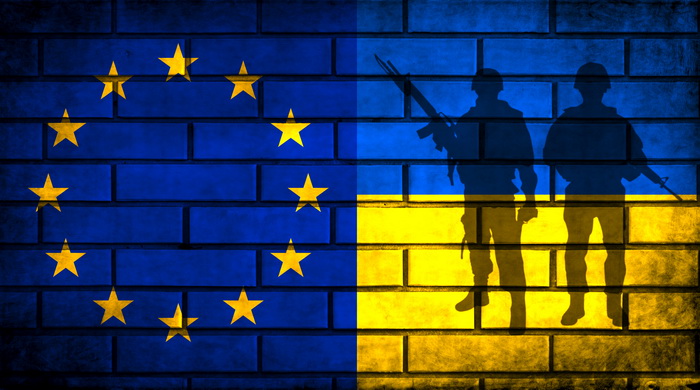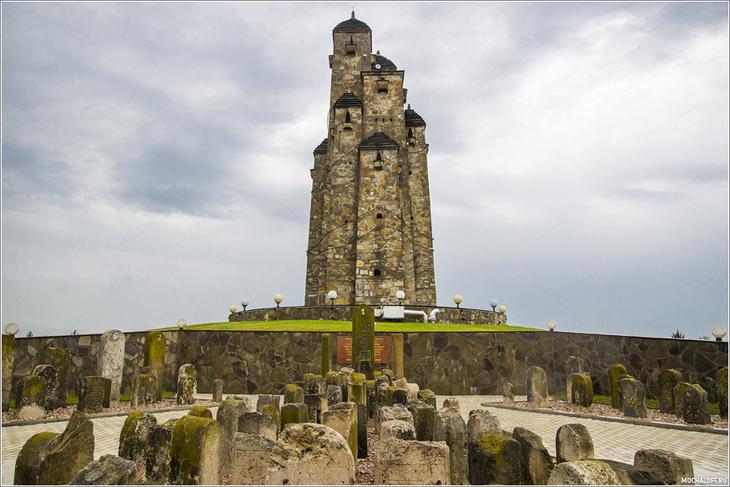Members of Polish Sejm are outraged: unlike Ukraine, rebels with blood of civilians on their hands aren’t glorified in Poland. The deputies mean the Ukrainian Insurgent Army (UPA), which is responsible for killing Poles in Volyn. Indeed, in Poland, the soldiers that killed Ukrainians are barely commemorated. However, Warsaw has started creating a cult of war criminals which on top of fighting the communists were killing civilian Belarusians, Lithuanians, and Slovaks, Igor Isajev writes at texty.org.ua portal.
When politicians of the Polish ruling party Prawo i Sprawiedliwość (PiS) responded to the letter of Ukrainian intellectuals on the Volyn tragedy, they sententiously emphasized: “In Poland, we don’t honor the memory of people who have blood of civilians on their hands.” However, that's not exactly the truth. Poland commemorates such people, and politicians of PiS do it with even more pomp than their predecessors.
"Cursed soldiers"
This term (żołnierze wyklęci) entered Polish parliamentary discourse at the beginning of the XXI century. In general, it stands for the Polish “forest brothers” which kept fighting the communists on the territory of Poland after the dismissal of the Home Army (Armia Krajowa, AK) in January 1945. This resistance lasted until around the 1950s, though, unlike the AK, some structures (over ten) were poorly coordinated – outright criminals were in their ranks as well.
From 2011 onwards, the 1st of March is a celebrated as a state holiday in Poland dedicated to the memory of warriors of the military anti-communist underground – it is the National Memory Day of the “cursed soldiers.” On this day in 1951, communists executed the death sentence against the leaders of one of the underground associations.
On the same day but in 1945, soldiers of the functioning AK department started massacring civilians in the Ukrainian village Pavlokoma – later this village became a symbol of martyrdom of Ukrainians in Poland. Here lays the danger of the cult of “cursed soldiers” – whilst for Central Poland they were fighters against communists, on its outskirts they became the embodiment of criminality.
Unfortunately, at that time the front of the struggle determined not only the political but also the national question. Here are a few examples of how Polish authorities honor heroes and criminals at the same time these days.
Zygmunt Szendzielarz — “Lupaszka”
This is the most well-known personality of the “cursed soldiers.” He was born in Stryi which is currently Ukrainian, but his activities were connected to the Vilnius region where structures of the Polish underground were strong.
Besides fighting against Soviet saboteurs, he was also known for crimes against Belarusians and Lithuanians. In 1944, his department killed Lithuanian defenders and civilians in the village of Dubingiai, not far from Vilnius.
In June 1948, “Lupaszka” was arrested by the members of Polish security service. Right after the arrest he was transported to Warsaw and imprisoned, where he stayed till February 1951. His remains were found a while ago.
This year, Polish authorities decided to rebury him at the highest level and give him the rank of colonel post mortem. On 22 April, a requiem was held in the Lodz Cathedral, in which Poland’s defense minister took part. “Taking leave of colonel Szendzielarz, we are saluting the independent Poland, which could’ve been gone by now,” the minister said during the ceremony.
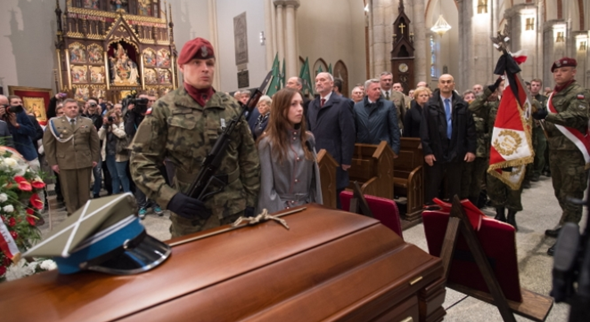
On 24 April, a ceremony of reburial of Zygmunt Szendzielarz took place in Warsaw. President Andrzej Duda took part in it. “Today the dignity of proud Poland comes back… Poland that bows its head and pays tribute to its great son,” Duda said.
Speech of Andrzej Duda
Romuald Rajs — «Bury»
Another person connected to the Polish movement of resistance in outskirts of Vilnius, though this time he is accused by the Orthodox peoples of Podlasye. After actions in outskirts of Vilnius Bury moved to Podlasye, Hajnowka.
The department headed by Bury was responsible for the death of Orthodox civilians of the villages of Zaleshany, Koncovizna, Shpaky. In the village of Stari Puhaly Bury, he shot three dozens of Belarus village residents who refused to be listed as Catholics. The ones that agreed survived.
This year, on 27 February, local Polish nationalists organized the march of “cursed soldiers” in Hajnovka carrying the photo of Bury. They announced about honorary patronage of president Andrzej Duda. Information about it even appeared on the official web-site of the head of the state, though disappeared quickly after the media reaction.
“In connection with the messages in the media about alleged patronage of the Polish President over the 1st Hajnovka March of the 'cursed soldiers' we would like to announce that the president didn’t patronage these events,” the official statement of the Office of the President from 15 February stated.

Jozef Kuras – "Ogien"
He is one of the leaders of the anti-communist movement on Podhale in Southern Poland, where the Slovak community lives. According to the Union of Slovaks in Poland, he robbed and killed the local Slovak population. According to other sources, he shot over a dozen of local Jews.
Despite this, in 2006, the monument to Ogien in the town of Zakopane was personally opened by then-president of Poland Lech Kaczynski. “In order to restore memory, I decided to be here today… Ogien is a hero worthy of honor, though we also know that today his figure sparks controversies. Exactly this is the reason why I interrupted my vacation and came here,” he said then.
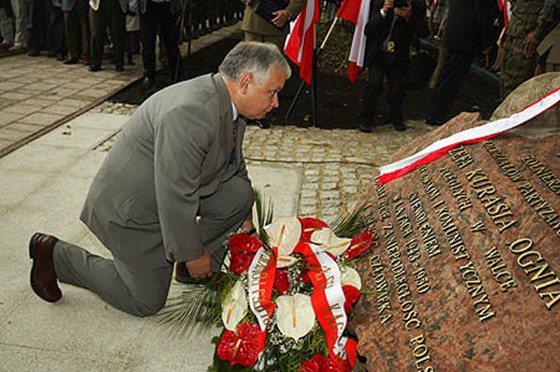
Mieczyslaw Pazderki – "Szary"
On 6 June 1945, Mieczyslaw Pazderski’s department killed almost two hundreds of civilians in the Ukrainian village of Verkhovyny. Two days later, the outnumbered department was attacked by the Red Army; Szary himself died near the village of Huty. That was one of the biggest fights of the Polish anti-communist underground against the communists.
The Polish President awarded Mieczyslaw Pazderski with the Cross of National Military Rank and Partisan Cross... back in 1992. Celebrations take place in eastern Poland, but only local authorities participate.
The latter story is an exception. I talked to a couple of historians and representatives of Ukrainian minority in Poland: none of them recalled state officials honoring Polish soldiers that had killed Ukrainians.
This means that the words of Polish deputies about Poland not honoring people with the blood of civilians on their hands, unlike Ukraine (meaning the UPA), should be amended to add that it's specifically Ukrainian civilians.
The criminal side of the heroes
Yet, on the territory of the former Polish-Ukrainian conflict, in particular in Przemysl, we can see many events dedicated to Bury and Ogien. Even though for a part of citizens they are undoubtebly heroes, many statements that these people are criminals exist in the public disourse in Poland.
Why does the criminal side of these people fade into the background? First of all, because in the Polish anti-communist underground there were no national-scale criminals, the way as the Ukrainian UPA leader Stepan Bandera is perceived as a great „black hero” for Warsaw.
Secondly, the memory of the “cursed soldiers” is important as a collective example of betrayal for the current Polish authorities. The Polish communists betrayed the “cursed soldiers” when they chased them. They were also betrayed by the Polish government in exile in London, which recommended them to lay down arms. “Betrayed” and “cursed” by everyone, they kept on fighting.
They fought for the “true Poland” – and as politicians of PiS suggest, their predecessors gave up on its ideals not only in the 1940s, but also in the 2010s.
That’s why the memory about these figures is also a part of Polish internal political debate. Not all Poles enjoyed events commemorating Lupaszka or Bury at the highest level. Public pressure, in particular from the PiS supporters, was most likely the reason that the President didn’t patron the events in Hajnowka.

